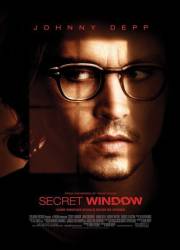Character mistake: After Mort finds the two bodies in the truck, he makes a great effort to avoid leaving any fingerprints on the door handle and also on the screwdriver he removed from the one body and takes with him. However, when he's pushing the car towards the cliff, he reaches in the window to grab the steering wheel with his bare hand, leaving his prints all over it and uses his other hand to push the truck.

Secret Window (2004)
1 character mistake - chronological order
Directed by: David Koepp
Starring: Johnny Depp, John Turturro, Maria Bello, Timothy Hutton
Continuity mistake: When Mort is trying to figure out what to write, he is pacing around and his hair is messed up. He walks to the chair (hair still a mess) sits down, then in the next shot there is a close up of his face and his hair is perfectly brushed.
John Shooter: You strike me as the kind of guy who's on the lookout for a head he can knock off with a shovel.
Trivia: One should really stay to the very end of the credits, as Johnny Depp (Mort) sings an amusing little tune.
Question: What is the meaning behind the Morton salt and other groceries that Mort buys at the end of the movie?
Join the mailing list
Separate from membership, this is to get updates about mistakes in recent releases. Addresses are not passed on to any third party, and are used solely for direct communication from this site. You can unsubscribe at any time.
Check out the mistake & trivia books, on Kindle and in paperback.




Answer: Mort Rainey buys the salt, butter, and napkins for eating the corn he grew in the garden above Ted and Amy's graves. The "Morton" brand of salt uses the advertising slogan, "when it rains, it pours." Mort Rainey's name can be translated to "raining death." The "Vanity Fair" napkins could be a refernce to Mort's personality.
raywest ★
The term Vanity Fair was coined (I believe first) by John Bunyan in 1678, as a place in a story called ‘The Pilgrim's Progress'. Mort is referred to as ‘Pilgrim' by a few different characters in the film, including himself, without much explanation until the serviettes. Brilliant. Vanity Fair in John Bunyan's story is a never-ending fair of frivolity, which is similar to Mort's charade of denial. Found this info when I searched the meaning of Vanity Fair on vocabulary.com.
Bunyan's The Pilgrim's Progress was also the inspiration for William Thackeray's 1847 novel, "Vanity Fair."
raywest ★